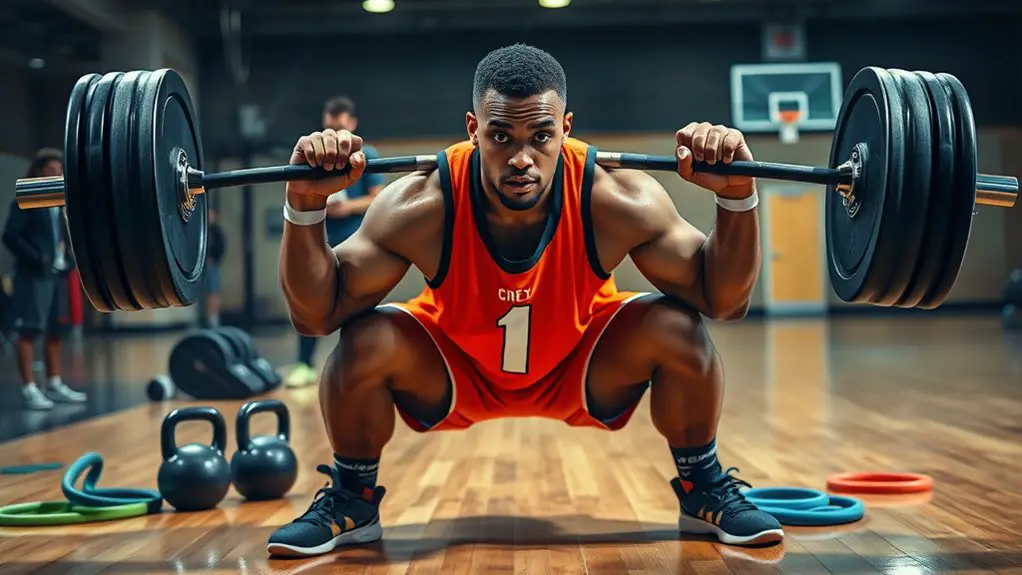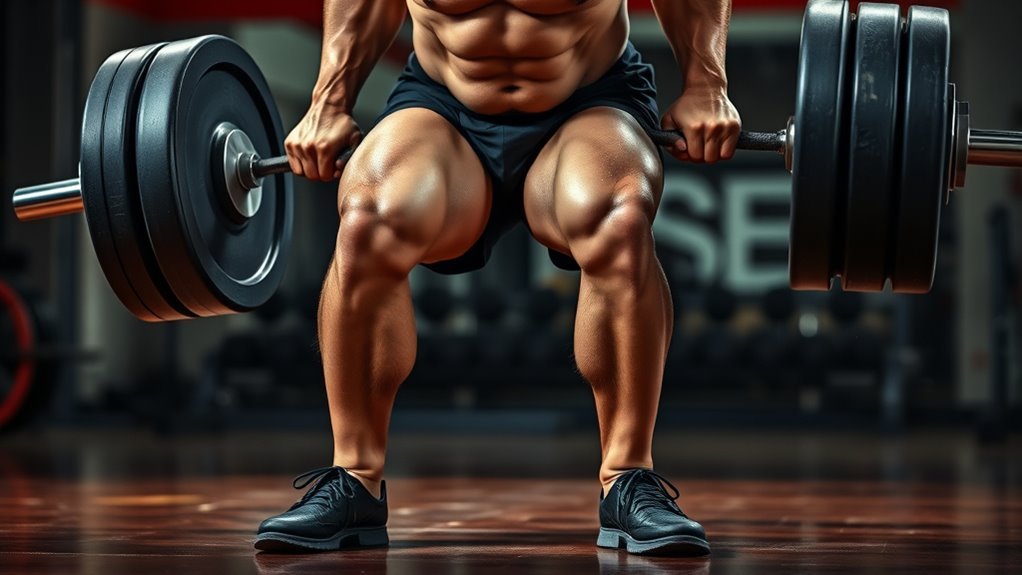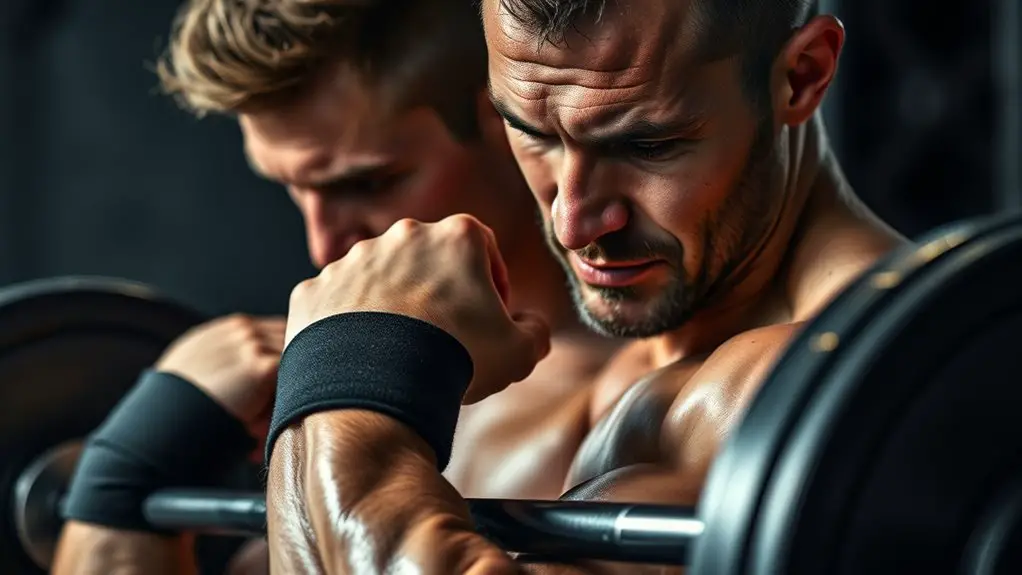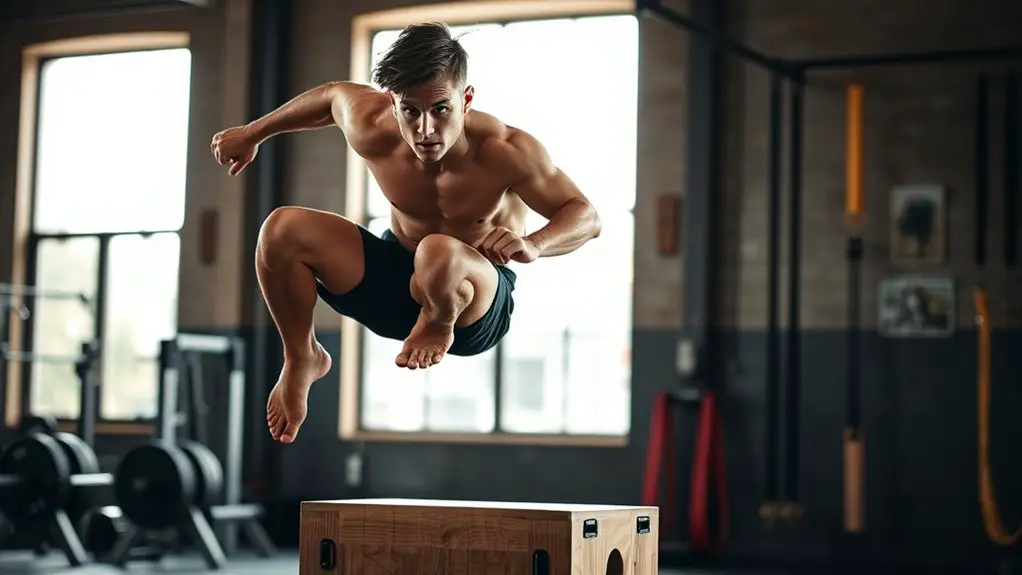To boost your basketball performance, focus on squats for lower body strength, deadlifts for power and stability, and lunges to improve agility. Don't forget the bench press to strengthen your upper body and enhance shooting and passing. Core exercises are essential too—they help you stay stable during quick movements. Together, these exercises will elevate your game and prevent injuries. Keep going to discover even more techniques to take your training to the next level.
Squats: Building Lower Body Strength
While you might think of squats as just another exercise, they're actually a fundamental strength-building move for basketball players. By incorporating squats into your routine, you're not just working on your legs—you're laying down the groundwork for explosive jumps and agile movements on the court.
When you squat, you're engaging your quadriceps, hamstrings, and glutes, which are essential for your overall athletic performance. This exercise also helps improve your balance and stability, allowing you to maneuver freely during games. Plus, it strengthens your core, giving you that extra support when you're driving to the basket or landing from a jump.
Incorporating squat variations can further challenge your muscles and enhance your performance on the court. Don't underestimate the power of proper squat form. With each repetition, you're not just building muscle; you're building confidence in your movements. So, embrace the squat, and watch how it transforms your game, giving you the freedom to play at your best.
Deadlifts: Enhancing Power and Stability
After mastering squats, the next step in building your strength as a basketball player is incorporating deadlifts into your routine. Deadlifts enhance your power and stability, two essential components for dominating on the court. By targeting multiple muscle groups, they'll help you jump higher, sprint faster, and maintain balance during intense plays.
Here are three key benefits of deadlifts:
- Core Strength: They engage your entire core, improving stability and posture, critical for quick movements and maintaining control.
- Leg Power: Deadlifts work your hamstrings, glutes, and quadriceps, giving you explosive power for those essential jumps and sprints.
- Grip Strength: A solid grip is fundamental in basketball. Deadlifts strengthen your hands and forearms, helping you secure the ball against defenders.
Additionally, deadlifts help develop strong posterior chain strength, which is vital for sports performance and injury prevention.
Incorporate deadlifts, and you'll feel the difference in your game, allowing you to release your true potential on the court.
Lunges: Improving Agility and Balance
Lunges are a fantastic addition to your training regimen, especially since they enhance your agility and balance on the court. When you perform lunges, you engage multiple muscle groups, including your quads, hamstrings, and glutes, which helps improve your overall stability. This stability is essential for quick directional changes during a game.
To get started, try incorporating variations like forward and reverse lunges into your routine. These help develop strength in both the front and back of your legs, boosting your ability to pivot and sprint effectively.
Focus on your form—keep your back straight and your front knee aligned with your ankle. Adding weights can further challenge your muscles and increase power. Additionally, incorporating full-body strength exercises into your training can further enhance your performance on the court.
Bench Press: Strengthening Upper Body
The bench press is one of the most effective exercises for strengthening your upper body, particularly for basketball players who rely on powerful shooting and passing. When you add this exercise to your routine, you'll notice improvements in your game and overall strength. Here are three key benefits:
The bench press is essential for basketball players, enhancing shooting, passing, and physical presence on the court.
- Enhanced Shooting Power: A stronger chest and shoulders help you generate more force behind your shots, making that swish sound more frequent.
- Improved Passing Ability: With increased upper body strength, you'll deliver precise passes with greater speed and accuracy to your teammates.
- Better Physical Presence: A strong upper body gives you an edge in physical matchups, helping you hold your ground against defenders.
Incorporating the bench press into your training can free you to play with confidence, elevating your game to new heights. Additionally, developing upper body strength is crucial for enhancing overall performance on the court. Embrace the challenge and watch your skills flourish on the court!
Core Exercises: Developing Stability and Endurance
While many focus on upper body strength, developing a strong core is just as vital for basketball players. Your core stabilizes your body during quick movements and helps you maintain balance while shooting, dribbling, or defending. Without a solid core, you may struggle to execute plays effectively.
Incorporate exercises like planks, Russian twists, and medicine ball throws into your routine. Planks enhance endurance, while Russian twists engage your obliques, essential for lateral movement. Medicine ball throws improve explosive power, giving you an edge when making those sharp cuts on the court.
Don't forget about dynamic movements like mountain climbers and stability ball rollouts. These not only build strength but also mimic the game's unpredictable nature. By focusing on your core, you'll access greater freedom in your movement, allowing you to play with confidence and agility. Additionally, a strong core helps prevent injuries by reducing strain on your body during intense physical activities. So, embrace core training—it's your foundation for on-court success.
Frequently Asked Questions
How Often Should Basketball Players Perform Strength Training?
So you think you can just shoot hoops all day? Strength training should be done two to three times a week. It'll boost your game while keeping you free from injuries. Balance is key, after all!
What Is the Best Time to Incorporate Strength Exercises?
You can incorporate strength exercises ideally during your off-season or pre-season. These times let you focus on building strength without the pressure of games, allowing for recovery and maximizing your performance when it counts.
Can Strength Training Improve Shooting Performance?
Absolutely, strength training can enhance your shooting performance. It builds stability, boosts power, and improves endurance, allowing you to maintain form longer. You'll find that stronger muscles contribute to better shot mechanics and consistency in your game.
Should Basketball Players Avoid Cardio While Strength Training?
You might think avoiding cardio while strength training is best, but it's not. Balancing both can enhance your endurance and performance. Embrace the freedom to mix them for ideal results on the court.
How Can I Prevent Injuries During Strength Exercises?
To prevent injuries during strength exercises, you should focus on proper form, warm up adequately, listen to your body, and gradually increase weights. Staying aware of your limits can help you train safely and effectively.




